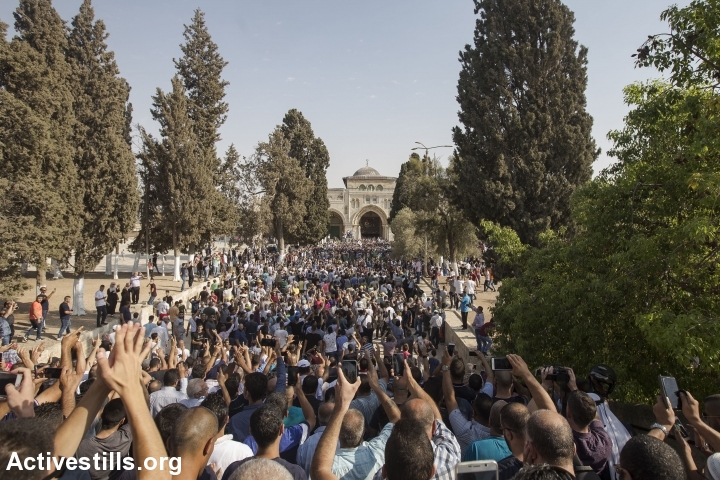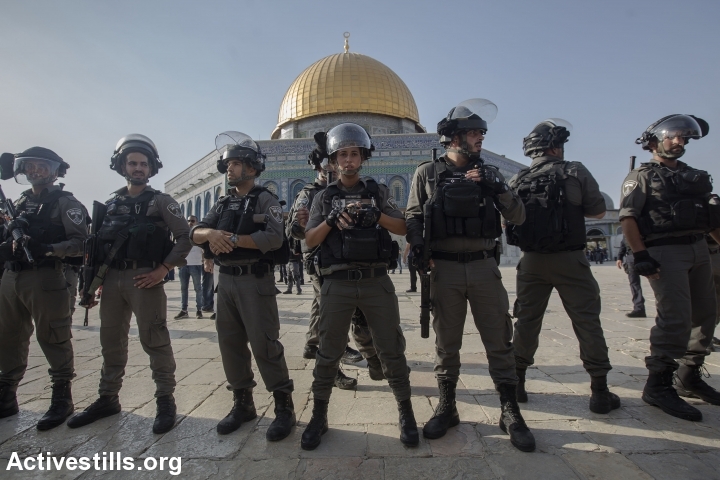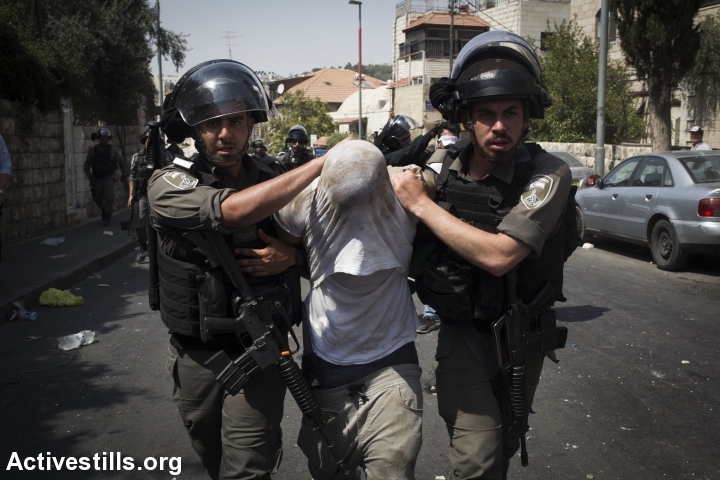After Israeli authorities removed controversial metal detectors from Al-Aqsa, Israeli police entered its main mosque, beat worshipers and medics, frogmarched over 100 detainees through the Old City and stuffed them into a city bus, according to a complaint filed by 10 of those arrested.
By Yali (Yael) Marom

Ten Palestinians recently filed a complaint with Israeli Justice Ministry’s Police Internal Investigations Department, Israel’s equivalent of an Internal Affairs unit, demanding it launch a criminal investigation against officers who brutally attacked Muslim worshipers inside a mosque at Al-Aqsa two months ago.
The police version
On Thursday, July 27, the Waqf, the Jordanian Islamic trust that manages the Haram al-Sharif/Temple Mount as part of a half-century-old arrangement with Israel, announced that worshipers should return to the site, Al-Aqsa Compound. Israel had just removed metal detectors from the entrance to the site, one of several measures Israeli authorities implemented after three Palestinian citizens of Israel killed two Border Police officers there. The metal detectors, along with other steps amounting to collective punishment against Palestinian residents of the Old City of Jerusalem, were lifted after more than a week of mass civil disobedience and popular struggle. Palestinians celebrated their rare victory but Israel’s security forces, it seems, had a different idea and warned of possible rioting. The mainstream media unquestioningly bought into to police narrative.
Thousands arrived to take part in the noon prayers that Friday. Dozens were wounded by police who attacked them in the Old City’s narrow alleyways leading to the mosque. Afternoon and evening prayers took place without incident. At around 10:30 p.m. police, using a megaphone, ordered the remaining worshipers to end their prayers and evacuate the premises. The worshipers complied.
Later that night, police reported that dozens of young Palestinians had locked themselves in al-Qabli mosque, the main mosque in al-Aqsa compound, and refused the police orders to exit. The police further claimed the youth also ignored Waqf officials, who urged them to cooperate. Thus, according to the police (and various media outlets that reported the events as told to them by police): “Police forces entered the mosque where the youth had barricaded themselves and attempted to remove them. A number of youth, who began rioting and clashing with the police, were arrested and taken in for questioning.”
The worshipers who were inside al-Qabli Mosque that night tell a different story.
The march of shame
The worshipers say there were around 120 people at al-Qabli Mosque at the edge of al-Aqsa compound that night. They claim they did not hear the police’s call to evacuate, and certainly did not barricade themselves inside the building.
At approximately 10:30 p.m., as they were praying, the mosque lights suddenly went out, and hundreds of police officers, wearing helmets and carrying flashlights and cameras, stormed in and tossed stun grenades among the worshipers. The violence caused panic among the worshipers, who according to the Internal Affairs complaint, said they ran toward the police officers out of fear. The police responded with batons and fists, and audibly encouraged each other to “fuck them up.”

Among those who filed the Internal Affairs complaint are three medics who were inside the mosque that night. According to their complaints, they too were physically attacked by police while they were treating a worshiper who lost consciousness after being shot in the head with a police-issue sponge-tipped munition. The three say that a commanding officer named Shlomi told the other officers to strip them of their medic uniforms and take their official medic identification cards. According to them, Shlomi himself ripped up one of the cards, announced that “there are no medics here,” and told the officers to “fuck everyone up.”
As the violence died down, the officers gathered the worshipers and medics in one corner of the room. The worshipers then raised their hands in surrender.
As the officers began making arrests, they would choose a worshiper would from the crowd and lead them a few steps forward. Officers would throw them to the ground, hit them with batons, punch and kick them, and only then place them in handcuffs, according to the testimonies in the Internal Affairs complaint. Others, already blindfolded and handcuffed, were shoved to the ground and stepped on.
The worshipers were then forced to get down on their knees and tilt their head toward the floor in a different corner of the mosque, detainees said. Some of them were made to put their heads between their knees. Everyone there, apart from a small number of women and elderly people, were arrested. Among those arrested were minors.

The police then took the detainees’ shoes and forced them to march in the streets of the Old City with their heads down. According to the testimonies, some of those arrested were led by an officer grasping them by the neck — one officer for every two Palestinians. A public city bus, apparently commandeered to carry the large number of Muslim worshipers to Jerusalem’s Russian Compound interrogation center, was waiting for them Mughrabi Gate of the Old City. As they arrived at the gate, officers forced every detainee to submit to a public body search in front of passersby, according to the testimonies.
At that point the police shoved over 100 detainees onto the bus. They were made to sit in the seats with their hands cuffed behind their backs, and when there were no more free seats, detainees were forced to sit on the laps of other detainees, according to their testimonies. A smaller number were loaded into police cars where they were made to sit on the floor of the car.
Many of the detainees were badly beaten, they say, with some requiring medical attention.
Who gave the orders?
Attorney Noa Levy of the Public Committee Against Torture in Israel, who is representing the complainants, says the incident at al-Qabli Mosque is just one example of the unreasonable treatment of worshipers by Israeli Border Police:
The crisis at al-Aqsa was a dangerous, inter-religious one. All eyes in the Middle East were focused on what was happening here, and the Border Police acted like a bull in a china shop. Barging into a mosque with grenades and sponge-tipped bullets during prayers is a red line, and we demand that the Internal Affairs Department undertake a serious investigation in order to prosecute those responsible. Unfortunately, the violence is a direct continuation of the police’s response to nonviolent protest in Israel.
The complaint included not only a demand to investigate the officers and commanding officers present but also all those who oversaw and approved the methods of detention used, as well as those who were present but did nothing to stop the violence.
Levy explains: “Anyone who has read these testimonies can easily understand that this was not the result of a bad decision by a low-level cop, but rather came from the upper echelons.”
The Justice Ministry, in which the Police Internal Investigations Department is housed, did not respond to a request for comment. An Israel Police spokesperson sent the following response:
This report does not reflect reality and its portrayal is biased, distorted, and one-sided.
Since two police officers were killed in a murderous terror attack at the Temple Mount, officers have on a daily basis dealt with thousands of rioters who seek to disturb the peace and harm police, visitors, and passersby.
Israel Police dealt with dozens of riots, although as they grew more violent and targeted police officers, the police acted resolutely to arrest the inciters and the rioters, in order to enforce the law and restore public order.
As more claims against police activities on that day and in that period arose, they were sent to the Internal Affairs Department, as is customary, and which is the correct place for [complaints] to be arbitrated .
Meanwhile, the systemic decision by your site to present those who disturb the peace, riot, and break the law as innocent citizens itself constitutes an attack on the rule of law, which one of the very foundations of a democratic state.
Fortunately for Israeli citizens, even this type of background noise won’t stop Israel Police from enforcing the law and maintaining public order on the Temple Mount, in Jerusalem, and everywhere else in the State of Israel.
Yael Marom is Just Vision’s public engagement manager in Israel and a co-editor of Local Call, where this article was originally published in Hebrew.
